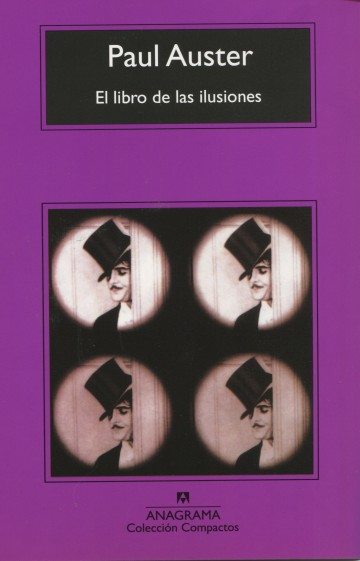Paul Auster o las ilusiones de la vida (Esp | Eng)
Luego de la muerte del reconocido escritor estadounidense Paul Auster el 30 de abril de 2024, me propuse volver a los textos suyos que poseo, y me centré en su novela El libro de las ilusiones, de 2003 (en edición española). Había escrito un pequeño post en su memoria (ver), donde me comprometía a escribir algo más extenso, y es lo que intento hacer con esta publicación.

Paul Auster fue —y seguirá siendo— uno de los más importantes novelistas norteamericanos de la avanzada segunda mitad del siglo XX y cuya producción se extendió durante las dos primeras décadas del XXI y un poco más (su última novela fue Baumgartner, de 2023). Fue también escritor de libros de no ficción (crónicas, memorias), brillante ensayista y dramaturgo, pero también guionista y director de cine. Recibió varios galardones, como el Premio Príncipe de Asturias en 2006. Fue un decidido defensor de la libertad de expresión, lo que lo llevó a oponerse a regímenes autoritarios, e incluso a asumir posiciones muy críticas dentro de su país (algo de esto pueden ver en el video en Referencias). Pueden informarse de su vida y su amplia obra literaria en la fuente indicada.
Me dedicaré a comentar algo de la mencionada novela: El libro de las ilusiones.

Ahora que volví a su novela, reparé en aspectos que no había avistado (es propio de toda lectura literaria), quizás por falta de referencia extraliteraria, que, si bien no es indispensable, puede ayudar en algunos casos, como es este.
Comencemos, por lo básico, un resumen de la historia de la novela:
David Zimmer, un profesor universitario de literatura, luego de perder a su mujer e hijos en un accidente de aviación, se abandona a la depresión y el retiro. Casualmente, ve en televisión uno de los filmes mudos de Hector Mann, un actor cómico de origen argentino, quien ha desaparecido desde los años 20. Luego de ver todas sus películas accesibles, escribe un libro sobre este personaje y sus filmes. Meses después recibe una carta de la esposa de Mann (Frieda), quien lo invita a Tierra de Sueño (en Nuevo México), pues Mann sigue vivo. Instigado por la visita de una mujer vinculada a esa familia (Alma), con quien Zimmmer establece una relación amorosa, viajará a esa tierra. Conocerá a HM en sus últimos momentos, verá su último filme: La vida interior de Martin Frost, en compañía de Alma, y después de la muerte de Mann, será testigo de la destrucción de toda su obra —según el deseo de aquel— y de otros percances fatales.
Cuando leí la novela, hace unos 18 años, no me había percatado en la relación de Paul Auster con el cine. Luego supe que estudió esa especialidad y que escribió guiones para películas mudas que nunca se realizaron, que él mismo reconoció como modalidad que le apasionaba.

En 2006, Paul Auster comenzó su segundo filme como director: La vida interior de Martin Frost, pero ya en 2003, en su novela El libro de las ilusiones, esta había sido prefigurada (no he visto el filme y no sé si puede identificarse con la novela). La película de Héctor Mann que David y Alma ven, en los últimos momentos, antes de la destrucción de la obra de HM, se titula así, y, por lo que nos dice el narrador (David Zimmer) es una dramática y ominosa realización cinematográfica de la vida de HM en despedida.
Por supuesto, será siempre muy difícil ilustrar lo que decimos o interpretamos de una novela. Veré si puedo, aunque sea con tres citas.
Todos queremos creer en lo imposible, supongo, convencernos de que
pueden ocurrir milagros. Considerando que yo era el autor del único libro
jamás escrito sobre Hector Mann, quizá fuera lógico que alguien pensara que
me iba a poner a dar saltos ante la posibilidad de que aún viviera. Pero yo no
estaba de humor para dar saltos. O al menos no creía estarlo. (...) Mi libro había
nacido de una gran pesadumbre, y aunque ahora todo había quedado atrás, el
dolor no había desaparecido.
Los títulos de crédito aparecieron en silencio, sin, música de fondo, sin
señales auditivas que preparasen al espectador para lo que iba a venir. Una sucesión de carteles blancos sobre fondo negro anunciaba los aspectos más
destacados. La vida interior de Martin Frost. Guion y dirección: Hector
Spelling.
(...) las películas de Héctor no se han perdido. Sólo han desaparecido, y antes o después surgirá alguien que abra casualmente la puerta del cuarto donde Alma las escondió, y la historia volverá a empezar desde el principio.
Vivo con esa esperanza.
Me cautivó de esta novela, ahora con avisada conciencia lectora, el juego de historias dentro de la historia (Auster reconoció su influencia de Don Quijote), pero también la dinámica lúdica con el cine: un realizador de cine mudo que termina siendo "enmudecido" por las circunstancias y ya eliminado por la destrucción de su obra.
Así también, el carácter metaliterario de esta obra, rasgo propio de Paul Auster, que aquí cobra un particular sentido. Mediante la referencia interna a su historia, el protagonista-narrador (David Zimmer) nos va enlazando con una compleja ficción por la que sentimos que estamos leyendo el libro conocido.
Referencias:
https://es.wikipedia.org/wiki/Paul_Auster
https://es.wikipedia.org/wiki/El_libro_de_las_ilusiones
https://web.archive.org/web/20150518053307/http://www.canal-l.com/index.php?id_video=315
https://es.pdfdrive.com/el_libro_de_las_ilusiones-de-paul-auster-d100384124.html
https://www.lagaceta.com.ar/nota/1033128/sociedad/murio-escritor-paul-auster-maestro-trilogia-nueva-york.html
![Click here to read in english]
###Paul Auster or the illusions of life
After the death of the renowned American writer <b<Paul Auster on April 30, 2024, I decided to return to the texts of his that I possess. , and I focused on his novel The Book of Illusions, from 2003 (in Spanish edition). I had written a small post in memory of him ([see] (https://peakd.com/hive-179291/@josemalavem/paul-auster-frente-a-la-muerte-or-paul-auster-in- the-face-of-death)), where I committed to writing something longer, and that's what I'm trying to do with this post.
Paul Auster was—and will continue to be—one of the most important American novelists of the late second half of the 20th century and whose production extended during the first two decades of the 21st century and a little more (his last novel was Baumgartner i>, 2023). He was also a writer of non-fiction books (chronicles, memoirs), a brilliant essayist and playwright, but also a screenwriter and film director. He received several awards, such as the Prince of Asturias Award in 2006. He was a determined defender of freedom of expression, which led him to oppose authoritarian regimes, and even to assume very critical positions within his country (some of this you can see in the video in References). You can find out about his life and his extensive literary work from the indicated source.
I will dedicate myself to commenting on something from the aforementioned novel: The Book of Illusions.
Now that I returned to his novel, I noticed aspects that I had not seen (it is typical of all literary reading), perhaps due to lack of extra-literary reference, which, although not essential, can help in some cases, such as this one.
Let's start with the basics, a summary of the story of the novel:
David Zimmer, a university professor of literature, after losing his wife and children in a plane crash, abandons himself to depression and retirement. Coincidentally, he sees on television one of the silent films of Hector Mann, a comic actor of Argentine origin, who has disappeared since the 1920s. After seeing all of his accessible films, he writes a book about this character and films it. of the. Months later he receives a letter from Mann's wife (Frieda), who invites him to Dream Land (in New Mexico), since Mann is still alive. Instigated by the sight of a woman linked to that family (Alma), with whom Zimmer establishes a romantic relationship, he will travel to that land. He will meet HM in his last moments, he will see his last film: The Inner Life of Martin Frost, in the company of Alma, and after Mann's death, he will witness the destruction of all his work – according to the desire of that one – and other fatal mishaps.
When I read the novel, about 18 years ago, I had not realized Paul Auster's relationship with cinema. Later I learned that he studied that specialty and that he wrote scripts for silent films that were never made, which he himself recognized as a modality that he was passionate about.
In 2006, Paul Auster began his second film as a director: The Inner Life of Martin Frost, but already in 2003, in his novel The Book of Illusions, this had been prefigured (I have not seen the film and I do not know if it can be identified with the novel). The Héctor Mann film that David and Alma watch, in the last moments, before the destruction of HM's work, is titled like this, and, from what the narrator (David Zimmer) tells us, it is a dramatic and ominous film production. of HM's life in farewell.
Of course, it will always be very difficult to illustrate what we say or interpret from a novel. I'll see if I can, even with three dates.
We all want to believe in the impossible, I guess, convince ourselves that
miracles can happen. Considering that I was the author of the only book
ever written about Hector Mann, perhaps it was logical that someone would think that
I was going to jump at the possibility that he was still alive. But not me
I was in the mood to jump. Or at least he didn't think he was. (...) My book had
born of great sorrow, and although everything was now behind us, the
pain had not disappeared.
The credits appeared in silence, without background music, without
auditory signals that prepared the viewer for what was to come. A
succession of white posters on a black background announced the most
highlights. The inner life of Martin Frost. Script and direction: Hector
Spelling.
(...) Héctor's films have not been lost. They've just disappeared, and sooner or later someone will emerge and casually open the door to the room where Alma hid them, and the story will begin again from the beginning.
I live with that hope.
I was captivated by this novel, now with a keen reading conscience, by the play of stories within the story (Auster recognized his influence from Don Quixote), but also by the playful dynamic with cinema: a film director mute who ends up being "muted" by circumstances and already eliminated by the destruction of his work.
Likewise, the meta-literary character of this work, a characteristic of Paul Auster, which takes on a particular meaning here. Through internal reference to his story, the protagonist-narrator (David Zimmer) links us with a complex fiction through which we feel that we are reading the familiar book.






Has sido votado por
PROYECTO ENLACE
'Conectando Ideas y Comunidades'
PROYECTO ENLACE es un proyecto de curación de habla hispana enfocado en recompensar contenido de calidad y apoyar autores en su proceso de crecimiento en HIVE.
Creemos y apostamos por el futuro de esta gran plataforma, y estamos muy emocionados de poder hacerla crecer junto a esta comunidad. Así que te invitamos a publicar en nuestra COMUNIDAD y estar atento a todas las actividades que tenemos preparadas y que estaremos publicando en breve.
¿QUIERES AUTOMATIZAR TUS GANANCIAS DE CURACIÓN? SE PARTE DEL PROYECTO ENLACE APOYANDO A NUESTRO TRAIL EN HIVE.VOTE INGRESA AQUÍ PARA CONOCER LOS DETALLES.
¿QUIERES INVERTIR ENLACE? DESCUBRE COMO HACERLO Y GENERAR INGRESOS DE FORMA SEMANAL MEDIANTE TU DELEGACIÓN DE HP AQUÍ TE EXPLICAMOS COMO.
Te invitamos a participar en nuestro servidor de Discord: https://discord.gg/3S9y7BbWfS
Atentamente
EQUIPO ENLACE 2024
Gracias, amigos de @enlace. Saludos.
Esta publicación ha recibido el voto de Literatos, la comunidad de literatura en español en Hive y ha sido compartido en el blog de nuestra cuenta.
¿Quieres contribuir a engrandecer este proyecto? ¡Haz clic aquí y entérate cómo!
I can teach you how to turn your $250 into $5,615 in 4 hours investing on Bitcoin mining.FOR MORE INFO;WHATSAPP NO:+1 (828) 487‑5668